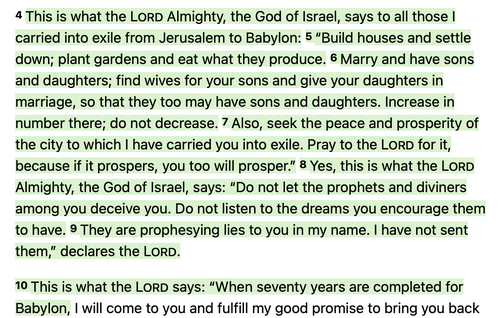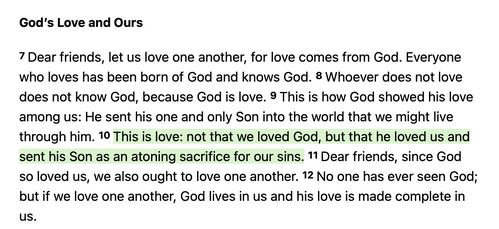The Story - Chapter 18
Last week, after dropping the girls off at school, I began my trek to the church. On a good day, it takes about 45 minutes, but that day was not a good day—it was raining. As I merged onto I-30 westbound, crawling at 4 MPH due to the weather and half of central Arkansas trying to get to downtown Little Rock, I thought to myself, Kenda did this commute for 10 years—I can do this! I can do anything for a few years!
Then I read what Jeremiah told the exiles in Babylon (this is from Jeremiah 29:4-10. The Story picks up with Jeremiah 29:10 on page 261.)
Then I read what Jeremiah told the exiles in Babylon (this is from Jeremiah 29:4-10. The Story picks up with Jeremiah 29:10 on page 261.)

I cannot do this drive for 70 years...
Per the prophet Jeremiah, Israel shouldn’t expect their captivity to be short. Not only must they endure their present situation, but they must also hold onto hope that one day it will get better, even as they wait patiently. They need to prepare for a long exile—one that will last more than a generation. This means they must learn to cope with life in a foreign land. They must be discerning about whom they listen to, learning to distinguish between true advocates and those who would cause them harm.
They have to find a way to make a home, a place of comfort and sustenance, in this foreign land—for themselves and their loved ones. They can’t put their lives on hold until they return home. Instead, they must live fully within their “new normal”—falling in love, marrying, having children, and raising them. Finally, they are commanded to seek the welfare of their captors and pray for them because if their captors prosper, their own lives in exile will be better.
They have to find a way to make a home, a place of comfort and sustenance, in this foreign land—for themselves and their loved ones. They can’t put their lives on hold until they return home. Instead, they must live fully within their “new normal”—falling in love, marrying, having children, and raising them. Finally, they are commanded to seek the welfare of their captors and pray for them because if their captors prosper, their own lives in exile will be better.
Their struggles are a bit worse than my commute!

What must they have thought? Those who received this word from Jeremiah likely weren’t young, and life expectancy wasn’t what it is today. Many of them would never return to Israel. It would be their children and grandchildren who made it back. Those receiving Jeremiah’s letter would, in all likelihood, die in captivity.
How do you hold on when you’re facing such a reality? How do people sentenced to life in prison without parole go on? How do those diagnosed with terminal illness continue? How do people living in the midst of war, natural disaster, poverty, or as refugees—losing hope that their circumstances will ever change—keep going? How do they live?
God heard their cries. Immediately after Jeremiah reveals that the exile will last 70 years, we find Jeremiah 29:11—a verse many of us have committed to memory, if not on our greeting cards, candleholders, pictures on our walls, and other decorative items. Isn’t it ironic (don’t you think?) that, in the midst of one of the most devastating circumstances one could find themselves, God through Jeremiah speaks some of the most hope-filled, inspiring, and comforting words in all of Scripture:
How do you hold on when you’re facing such a reality? How do people sentenced to life in prison without parole go on? How do those diagnosed with terminal illness continue? How do people living in the midst of war, natural disaster, poverty, or as refugees—losing hope that their circumstances will ever change—keep going? How do they live?
God heard their cries. Immediately after Jeremiah reveals that the exile will last 70 years, we find Jeremiah 29:11—a verse many of us have committed to memory, if not on our greeting cards, candleholders, pictures on our walls, and other decorative items. Isn’t it ironic (don’t you think?) that, in the midst of one of the most devastating circumstances one could find themselves, God through Jeremiah speaks some of the most hope-filled, inspiring, and comforting words in all of Scripture:

While God's words through Jeremiah are significant, His actions are just as important—God listened, God encouraged, and God loved His people, even in exile.
First, God listened. The very existence of the book of Jeremiah is proof that God heard the cries of the exiles and responded to their prayers. Jeremiah reminds them in verse 12: Then when you call upon me and come and pray to me, I will hear you. When you search for me, you will find me; if you seek me with all your heart, I will let you find me. God listens before He acts.
God encouraged. In Jeremiah 29:4-7, Jeremiah tells the exiles—who expected a speedy return to Jerusalem—to stay put, build homes in Babylon, and even seek the well-being of their captors. That wasn’t the answer they were looking for. Yet God's people weren’t to resist, resent, or reject their current situation. They weren’t to flee or fight. Instead, they were to put down roots, live productive lives in exile, and even pray for the welfare of their new neighbors. This was a revolutionary command—one they couldn’t follow without God’s help and encouragement.
Finally, we see that God loved His people. He reminded them of a hope that is real and trustworthy. God gave His exiled people a promise when they had none; a love when they felt abandoned. But as we are reminded in 1 John 4, that's how the love of God is shared...
First, God listened. The very existence of the book of Jeremiah is proof that God heard the cries of the exiles and responded to their prayers. Jeremiah reminds them in verse 12: Then when you call upon me and come and pray to me, I will hear you. When you search for me, you will find me; if you seek me with all your heart, I will let you find me. God listens before He acts.
God encouraged. In Jeremiah 29:4-7, Jeremiah tells the exiles—who expected a speedy return to Jerusalem—to stay put, build homes in Babylon, and even seek the well-being of their captors. That wasn’t the answer they were looking for. Yet God's people weren’t to resist, resent, or reject their current situation. They weren’t to flee or fight. Instead, they were to put down roots, live productive lives in exile, and even pray for the welfare of their new neighbors. This was a revolutionary command—one they couldn’t follow without God’s help and encouragement.
Finally, we see that God loved His people. He reminded them of a hope that is real and trustworthy. God gave His exiled people a promise when they had none; a love when they felt abandoned. But as we are reminded in 1 John 4, that's how the love of God is shared...

For the people of Israel, love comes from the very heart of the Lord. It is the secure knowledge that they are never alone in their struggles. Their God has not abandoned them. Even though they would not see their homeland for many years, they could still call upon the Lord, knowing He would hear them. When they searched for the Lord, they would find Him. Even in the face of suffering, they could take comfort in the truth that they were God’s beloved children.
And we can depend on that, always. Even on (especially on?!?) I-30!
And we can depend on that, always. Even on (especially on?!?) I-30!
Recent
Archive
2025
January
2024
August
October
Categories
no categories

No Comments